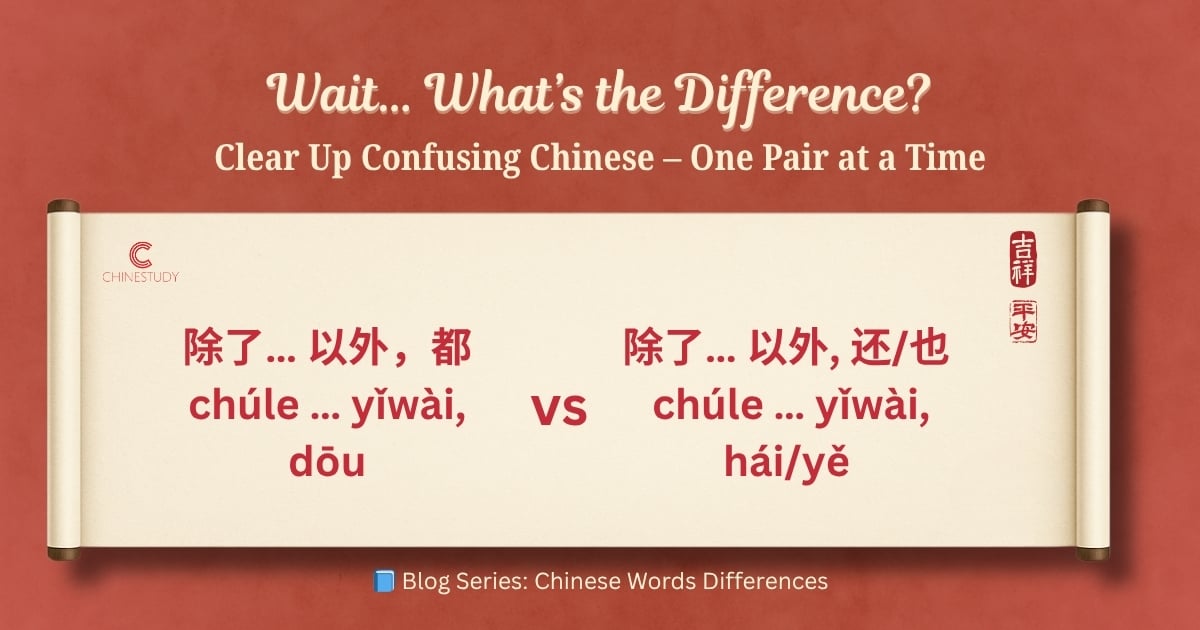🤯 除了…以外,都 vs 除了…以外,还 / 也 – What’s the Difference?

Both patterns use 除了 (chúle) — but don’t be fooled. One means “except,” the other means “in addition to.” Totally different!
Let’s break them down so you can stop mixing them up. ✍️
🔍 Breakdown
🟡 除了… 以外,都 (chúle … yǐwài,dōu) – “Except for…”
- Exclusive: what follows 除了 is not included
- Structure: 除了 A,都 B
- Emphasizes that all others do something — except A
📌 Use this when talking about who/what is left out of the group.
🟢 除了… 以外,还/也 (chúle … yǐwài,hái/yě) – “In addition to…”
- Inclusive: what follows 除了 is included
- Structure: 除了 A,也 / 还 B
- Means A is not the only one — there’s more
📌 Use this when adding more to the statement.
💬 Easy Examples
🟡 除了… 以外,都 (chúle … yǐwài,dōu) – “Except for…”
Example 1:
除了我以外,大家都去过中国。
(Chúle wǒ yǐwài, dàjiā dōu qù guò Zhōngguó.)
👉 Everyone has been to China, except me.
Example 2:
除了星期天以外,我每天都上班。
(Chúle Xīngqītiān yǐwài, wǒ měitiān dōu shàngbān.)
👉 I work every day except Sunday.
🟢 除了… 以外,还/也 (chúle … yǐwài,hái/yě)– “In addition to…”
Example 1:
除了唱歌以外,她还喜欢跳舞。
(Chúle chànggē yǐwài, tā hái xǐhuān tiàowǔ.)
👉 Besides singing, she also likes dancing.
Example 2:
除了中文以外,我也会说英语。
(Chúle Zhōngwén yǐwài, wǒ yě huì shuō Yīngyǔ.)
👉 Besides Chinese, I can also speak English.
⚠️ Common Mistakes (Watch Out!)
❌ 除了他以外,都大家来了。
(Chúle tā yǐwài, dōu dàjiā lái le.)
📝 The subject 大家 should be put before 都.
✅ 除了他以外,大家都来了。
(Chúle tā yǐwài, dàjiā dōu lái le.)
👉 ✔ Use “都” after the subject.
🎯 Interactive Practice
Choose the better word: 都 (dōu) or 还 (hái) / 也 (yě)
1. 除了米饭以外,我_____吃了点水果。
(Chúle mǐfàn yǐwài, wǒ _____ chī le diǎn shuǐguǒ.)
👉 I also ate some fruit besides rice.
✅ Correct answer: 还 (hái) / 也 (yě)
2. 除了你以外,大家_____不知道这件事。
(Chúle nǐ yǐwài, dàjiā _____ bù zhīdào zhè jiàn shì.)
👉 Everyone except you doesn’t know this.
✅ Correct answer: 都 (dōu)
3. 除了英语以外,她_____会说日语。
(Chúle Yīngyǔ yǐwài, tā _____ huì shuō Rìyǔ.)
👉 Besides English, she can also speak Japanese.
✅ Correct answer: 还 (hái) / 也 (yě)
4. 除了小王以外,其他人_____没交作业。
(Chúle Xiǎo Wáng yǐwài, qítā rén _____ méi jiāo zuòyè.)
👉 Everyone except Xiaowang didn’t hand in homework.
✅ Correct answer: 都 (dōu)
🚀 Final Tip
- Use “还” / “也” to say “and also…”
- Use “都” to say “everyone/everything except…”
✍️ Try making two sentences:
- One with 除了…以外,还 / 也
- One with 除了…以外,都
Understanding this one rule helps you avoid a LOT of mistakes!
Just one word can flip your meaning—don’t miss the rest of the series! 👉 check them out here! 😄📘
Thank you for subscribing!
Have a great day!